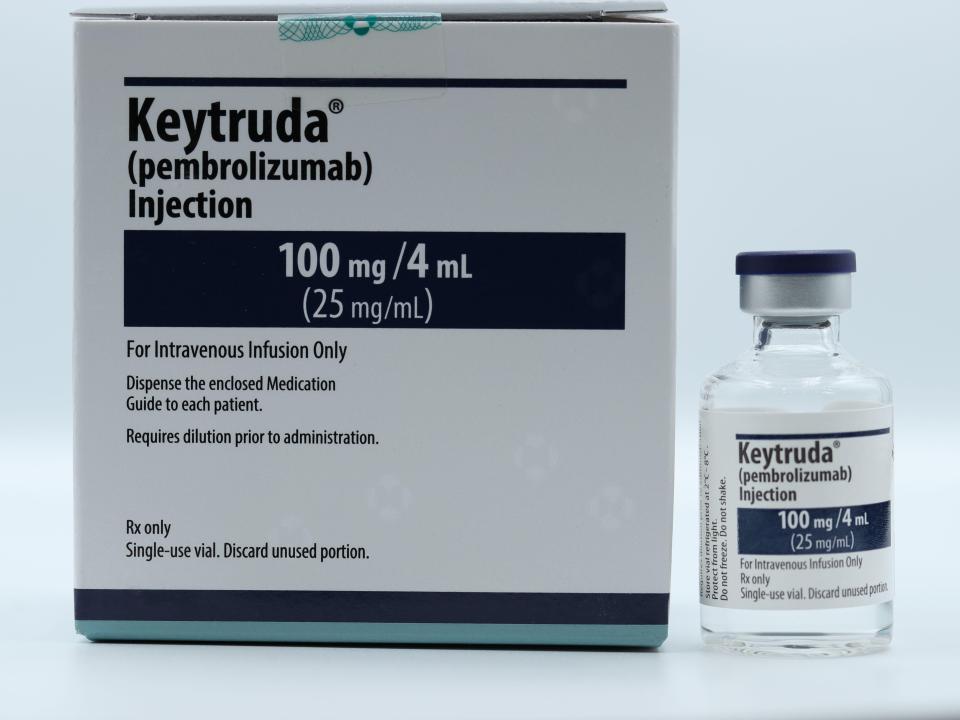WOMEN with advanced womb cancer have been given fresh hope with the approval of a new drug.
The treatment, which can slash the risk of death by 26 per cent, was given the green light for widespread NHS use.
Just 15 per cent of women live for five years if they have been diagnosed with advanced endometrial cancer – a cancer which usually starts in the lining of the womb.
The National Institute for Health and Care Excellence (NICE) has now made a treatment, called pembrolizumab, available on the NHS in England for people with advanced or recurring endometrial cancer.
The drug can slow down cancer growth and improve survival odds, health officials said.
NICE estimates that around 2,100 women will benefit from the treatment each year.
It said that its approval of the treatment marks a “major step forward” in treatment for women with this type of cancer.
Pembrolizumab, also known as Keytruda and made by Merck Sharp and Dohme, is an immunotherapy drug.
This is a type of treatment that mobilises the body’s own immune system to fight cancer.
The drug is delivered in a drip alongside chemotherapy drugs carboplatin and paclitaxel and can be given to patients for up to two years.
According to NICE, clinical trials show the combination of treatments reduced the risk of death by 26 per cent compared to chemotherapy alone.
The drug combo can also slow down cancer progression, the regulator added.
Helen Knight, director of medicines evaluation at NICE, said: “For people with advanced endometrial cancer, this innovative combination offers a powerful new treatment option.
“It marks a major step forward, and we’re pleased to recommend it as part of our commitment to getting the best care to people, fast, while ensuring value for the taxpayer.”
Around 9,700 women are diagnosed with endometrial cancer – also known as womb or uterine cancer – each year, making it the most common gynaecological cancer in the UK, according to NICE.
The disease is most common in older women.
Womb cancer symptoms
Cancer of the womb is often called uterine or endometrial cancer.
Symptoms include:
- Bleeding after the menopause
- Bleeding that is unusually heavy or persistent between periods
- Abnormal vaginal discharge (this might be pink)
- Anaemia
- High platelet count
- High blood sugar levels
- Stomach pain
- Swollen tummy
- Bloating
- Change in bowel or bladder habits
- A new cough
Being overweight or obese is one of the biggest risks of womb cancer, according to Cancer Research UK.
Other risk factors include age (most women diagnosed are aged 75 to 79) as well as being on hormone replacement therapy (HRT) and having diabetes or polycystic ovary syndrome (PCOS).
Having too much of the hormone oestrogen is thought to raise your risk of womb cancer, according to the Eve Appeal.
Fat cells in the body store oestrogen, even after the menopause and obesity has been linked to womb cancer because of its effect on oestrogen levels.
It’s not always possible to prevent womb cancer, but some things are thought to reduce your risk, like maintaining a healthy weight.
Source: Cancer Research UK
Its most common symptom is abnormal bleeding from the vagina, that is heavier than usual and occurs between periods or after menopause.
It can also cause pink-tinged vaginal discharge, as well abdominal pain, bloating and a change in bladder or bowel habits.
Helen Hyndman, lead nurse at the charity Eve Appeal’s information service Ask Eve, said: “Primary advanced or recurrent womb (endometrial) cancer has a huge impact on the quality of life for those diagnosed.
“It is great news that this new treatment has been approved.
“It will offer hope, a better quality of life and improve outcomes for those affected.”













